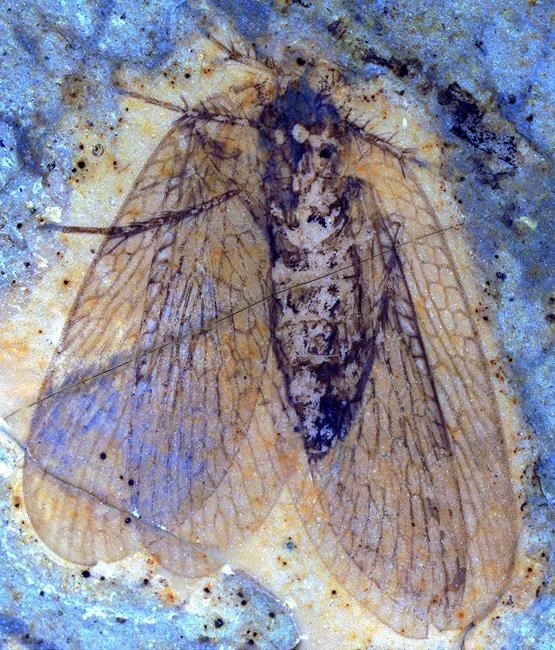
A 53-million-year-old insect fossil called a scorpionfly is shown in a handout photo. It was discovered at British Columbia's McAbee fossil bed site and is strikingly similar to fossils of the same prehistoric age from Pacific-coastal Russia and identified in 1974. THE CANADIAN PRESS/HO-Simon Fraser University MANDATORY CREDIT
Republished April 03, 2018 - 1:28 PM
Original Publication Date April 03, 2018 - 11:16 AM
VANCOUVER - It seems Canada and Russia have a prehistoric connection of the "beautiful" but "cockroachy" kind involving a 53-million-year-old insect fossil called a scorpionfly.
Paleoentomologist Bruce Archibald of Simon Fraser University and the Royal BC Museum said the discovery in British Columbia's McAbee fossil beds is strikingly similar to fossils of the same age from Pacific-coastal Russia.
A previous connection between the countries' Pacific regions has been found in the same area near Cache Creek, B.C., through fossilized plants and animals.
Archibald said his identification of the colourfully winged species of scorpionfly found at the protected heritage site is another example of Canada and Russia's ancient geographical link, before the continents split apart.
"They kind of look cockroachy, although I don't want people to be disgusted. Today, they have one living relative in Chile, of this group that we discovered fossils of, in the southern beach forest called the Valdivian forest."
The Canadian species of scorpionfly is dubbed Eomerope eonearctica, and its Russian cousin is named Eomerope asiatica.
The latter was identified in 1974 by a researcher who now works at the Russian Academy of Sciences in Moscow and is Archibald's co-author on an article published online in The Canadian Entomologist.
The article also features the discovery of another scorpionfly species found about two years ago by amateur Kathy Simpkins in a fossil she collected during an outing with a rock and fossil club near Princeton, B.C. It's been coined Eomerope simpkinsae.
The scorpionfly Archibald identified was from a collection at Thompson Rivers University in Kamloops, B.C. He said it tells a story of how a group of insects travelled to different parts of the world through shifting continents and the rise and fall of sea level.
"I recognized off the bat that this was something special and something different," he said.
"In the Russian one the wings were almost all clear and in ours the wings are sort of tinted, with a little bit of colour on them. Aside from that you can't really tell them apart and that's pretty interesting."
He said the similarities feed into the big picture of the migration of animals and plants across what is now the Bering Strait.
"In paleoentomology, we use insects almost like a detective uses fingerprints to put together a much bigger story of how life has changed and how the earth has changed."
Scientists believe the northern continents were connected millions of years ago but moved over time through plate tectonics.
"At that time you could walk from Vladivostok, in Russia, to Vancouver, and you could walk from Vancouver right onto Greenland and then over into Europe all the way without getting your feet wet. And it was mild climate so there were forests right up the Arctic Ocean," Archibald said.
He said his work is part of a "golden age of discovery" in B.C., where fossilized insects are almost an unknown resource.
"Fossil sites in the continental United States and in Europe and a lot of places have been explored for a long time, 100 years or so. But we in British Columbia remained relatively remote until quite recently," he said of a time before much of the province was connected through highways in the 1950s.
— Follow @CamilleBains1 on Twitter.
News from © The Canadian Press, 2018